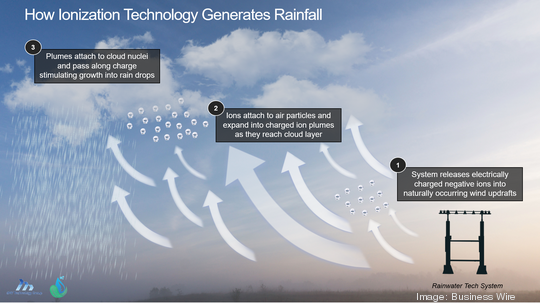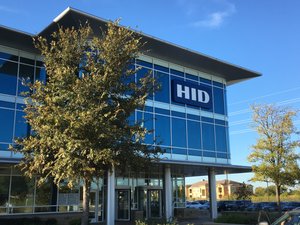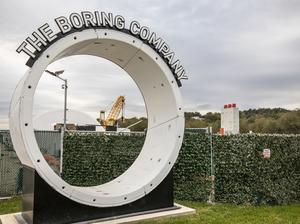
Mike Nefkens gets big ideas as he flies planes across the U.S.
This one is fairly obvious, in a sense.
The commercially-rated pilot, better known for leading Austin-based IoT company Resideo as it spun out from Honeywell in 2018, watched as the ground below kept getting browner and the veins of water squiggling across the landscape kept getting drier.
"When you're up in the air and you're looking down, you see the impact," he said.
That, paired with endless headlines about drought and wildfire, led him on a deep dive into how to squeeze more water out of the clouds. The most common approach appealed to him – pilots fly into developing storm fronts and essentially ignite flares with silver iodide and other compounds to encourage them to expand and dump more atmospheric water.
That's cloud seeding — it's been around for decades and has been used in Texas since the late 1990s. In his research, Nefkens found another emerging method that doesn't require flying planeloads of chemicals around. It's called ionization, and Nefkens has been hyper-focused on it since last year.

Now, Nefkens has built a company around the new ionization technology. Along with a mostly Austin-based team, he is planning to merge Rain Enhancement Technologies Inc. with a blank check company called dMY Technology Group VI to take the company public on the New York Stock Exchange.
While no exact timeline is set, Nefkens said he expects the company to be listed under the ticker "RANY" on the NYSE in the first half of 2023. The deal is expected to give the company a pro forma valuation of $200 million, but much remains to be seen as the merger develops.
It's a quick turnaround for such a young company, and it comes as SPAC mergers have largely fallen out of favor, at least compared to the flurry of SPAC deals seen just a couple years ago.
Nefkens said the time is right. Rain Enhancement Technologies, which will go by Rainwater Tech, has acquired IP from a couple different entities that have tested the technology in the Middle East and Australia. And Rainwater Tech believes it has the right partner in dMY, which has also taken quantum computing company IonQ and earth observation company Planet public via SPAC mergers. Nefkens has worked with dMY in his previous roles, and one of dMY's lead partners also lives in Austin.
"There is an element of being a public company, I think, where there's a little bit more credibility with customers," he said. "And ... it shows we have the proper controls in place. We're meeting all the SEC guidelines. It just gives us a little bit more what I would call 'go to market credibility' than if we were venture-funded and we needed to continue every four or five months seeking an extra round. So this allows us to be able to get pretty much all the capital we need to go be successful in one shot, and it gives us the credibility of being a public company."

Nefkens said Rainwater Tech is the first company of its kind to go public.
The company will begin selling soon, and it is focused on large landowners, such as ranchers, as well as golf course communities, ski resorts and other thirsty areas. It is also looking to sell to consortiums of insurance companies, which would benefit by making some areas, especially out west, less prone to devastating wild fires.
"We're working with the water authorities in multiple counties and states, even at the federal level, looking at doing some big projects with them," Nefkens teased. "So obviously, for us, the Holy Grail here would be things like supporting the Great Salt Lake and getting that filled up again, the lower Colorado River..."
Rainwater Tech says that through third-party trials the ionization tech can enhance rainfall between 9% and 18% without using any chemicals. The process can get more rain out of clouds by dragging down forming ice high in the atmosphere, Nefkens said.
"I wish we had a system that was big enough to be able to drop all the water out of the system, but no," he said. "Each antenna can do an area of about a 50 mile radius from the antenna, and that depends on winds as well. And what we've seen in our other trials is we're enhancing range anywhere from 8% to 20%. So they're significant for the areas that get it, but they don't impact areas down river."
The SPAC deal was announced Dec. 22. In its first conference call about the deal, the company suggested its business model will be strong.
"We are targeting gross margins to be greater than 70% and bookings that will provide predictable recurring revenues. We aspire to drive considerable revenue growth with profitability and positive cash flow," a transcript of the call reads. "As a result, we do not expect to be reliant on subsequent public equity after the initial launch."
Nefkens, who was also previously an executive vice president at HP, grew up in Texas and, after a stint in California, has now lived in Austin for four years. The company's chief product and strategy officers also live in Austin. Rainwater Tech operates remotely, but is poised to open a warehouse in Austin to assemble its ionization antennas. Nefkens declined to say how big or where that would be because the company is currently negotiating with two owners for the new space.
It's not clear whether Rainwater Tech will ultimately be headquartered in Austin or Las Vegas, which is home to dMY. But Nefkens said he expects the core of the team's leadership will be in Austin.
"Austin is kind of the perfect place to incubate something like this on the climate tech side," he said.







